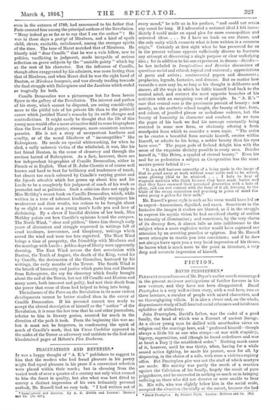IMAGINATIONS AND REVERIES.* Ix was a happy thought of "
A. E.'s " publishers to suggest to him that the readers who had found pleasure in his poetry might find equal pleasure in his prose if a convenient selection were placed within their reach ; but in choosing from the varied work of over a quarter of a century not only what seemed to him the finest in quality, but also what was best fitted to convey a distinct impression of his own intimately personal outlook, Mr. Russell had no easy task. " I had written out of
• Imaginations and laccrier. Ly A. E. Dublin and London: Mannsel and Co. [5s. net.]
every mood," he tells us in his preface, " and could not retain any mood for long. If I advocated a national ideal I felt imme- diately I could make an equal plea for more cosmopolitan and universal ideas. . . . So I have no book on one theme, and the only unity which connects what is here written is a common origin." Certainly at first sight what ho has preserved for us in the present volume appears sufficiently diverse to frustrate any attempt at discovering a single purpose or clear underlying
idea ; for in addition to his one experiment in drama—Deirdre- he has included in Imaginations and Reveries discussions of questions social and ethical, topical and universal ; appreciations of poets and artists ; controversial papers and discourses ;
prophecies, legends, fantasies, and dreams. But no matter how versatile a man may be, so long as his thought is deliberate and sincere, all the ways in which ho fulfils himself lead back to the central mind, and connect the most opposite branches of his activities with an energizing core of principle. In " A. E.'s " case that central core is the passionate pursuit of beauty : not merely, as the aesthetic school taught, the beauty of line, form, and colour, of jewelled phrase or melodious cadence, but the beauty of humanity in character and conduct. As we turn the pages of his book we find his message constantly being restated in some new form, or obviously offering a fresh standpoint from which to consider a worn topic. " The artist as he creates a beautiful form outside himself, creates within himself, or admits to his being, a nobler beauty than his eyes have seen." The pagan gods of Ireland delight him with the sense of the exquisite divinity possible in every man. Deirdre herself is, " like Helen, a symbol of eternal beauty." Even his zeal for so pedestrian a subject as Co-operation has the same motive-power behind it :—
" It is a dull business unworthy of a being made in the imago of God to grind away at work without some noble end to be served, some glowing ideal to be attained. . . . I hate to hear of stagnant societies who think because they have made butter well that they have crowned their parochial generation with a halo of glory, and can rest content with the fame of it all, listening to the whirr of tho steam separators and pouching in peace of mind the extra penny a gallon for their milk."
Mr. Russell's prose style is such as his verse would have led us to expect—harmonious, dignified, and exact. Sometimes in the fantasies the images it evokes are blurred, as if in the struggle to express his mystic vision he had sacrificed clarity of outline to intensity of illumination ; and sometimes, by the very charm of its dreamy flow, it almost lulls us into indifference to the subject when a more explosive writer would have captured our attention by an arresting paradox or epigram. But Mr. Russell never attempts to startle you into conviction ; and if he does not always leave upon you a very lucid impression of his theme, he leaves what is much more to the point in literature, a very deep and accurate impression of himself.


































 Previous page
Previous page